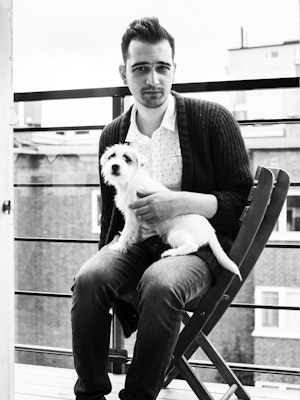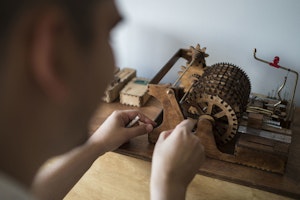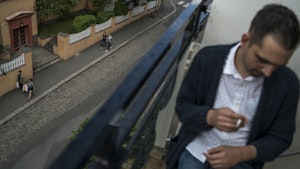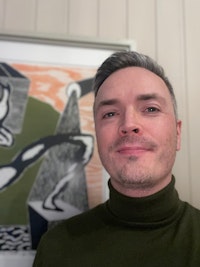Koka Nikoladze is a composer, instrument inventor, performing musician, programmer and music researcher. He was born in 1989, and studied violin in his home city of Tbilisi, composition in Stuttgart and music technology at the Norwegian Academy of Music. This is where he is now working as a PhD research fellow, studying how data technology can help move the goalposts as regards what it is possible for a practitioner to perform, as well as how composers can communicate with performers when music is created on the spot — questions on the verge of the unimaginable. Koka flourishes here. He is almost obsessed by ideas, he tells me. It’s just a case of keeping up with them, managing to realise them as quickly as possible. His maxim is to work 24/7.
The instrumentis the composition
Some rarities of contraptions are on display in the living room, objects you immediately bend over to scrutinise more closely: veneer, metal wires, a half-full Pepsi bottle, a keyring, a fork, coil springs, a snapped-off plastic ruler, a breadboard, matchboxes. When the various parts are activated with the aid of a handle, or a motor or computer, they make noises — funny noises that are repeated in creaky, blaring, grating, shuffling, distorted and odd rhythmical patterns.
“I started to make these machines without any inkling of what they would turn out to be, spontaneously and haphazardly, to calm myself down in a stressful period. But now that I’ve been busy on this for a while, I can see that what interests me is to take different objects you wouldn’t expect to be used to make music and use them in a musical context. How much music I can make with each instrument makes little difference. Composing an instrument is enough in its own right to satisfy my artistic thirst.”
The things and the ideas
He is very particular about the sounds, the colour and the character, and he is still on the lookout for parts to fit the mechanics he chooses. Then he goes to the Clas Ohlson hardware store.
“Not necessarily to buy anything, but to get ideas, to imagine the sound of different items. I expect I’ve tried every type of saw blade they have, every type of spring and screw... They sometimes have really gorgeous bicycle bells. I might also try Robert Dyas or IKEA. I just wander round, surrounded by these things, and think.”
Convoluted path
Koka Nikoladze first studied the violin at the conservatory in Tbilisi, but during his studies he became more and more taken with composition along the way. He sat his Bachelor’s exam anyway, passing with flying colours incidentally, before travelling to Stuttgart and starting to study composition at the Royal Conservatory of Music. Here he studied under Marco Stroppa, a composer known for combining acoustic and electronic instruments. After doing a Bachelor’s degree here, too, again with the highest grade, he applied to the Academy of Music in Oslo.






